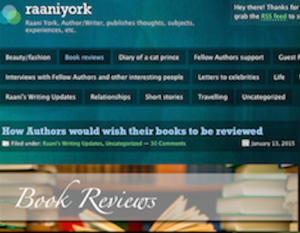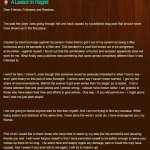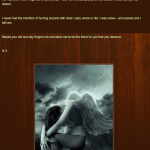 Last week author, Raani York had a mishap. She well and truly stepped in the shit. And in the microcosm that is a certain circle of Goodreads, it blew up.
Last week author, Raani York had a mishap. She well and truly stepped in the shit. And in the microcosm that is a certain circle of Goodreads, it blew up.
Lucky for Raani, it never went much farther than that. Unfortunately for her book, Dragonbride, it was far enough. Over the course of four days, the book was hit with almost forty 1-star ratings. Now, even including Raani’s own 5-star rating and a couple others that it’s been suggested may be the result of review swaps (I don’t know or care, since even they’d average out eventually), it carries a 1.72 average. It’s unlikely to recover.
I don’t intend to spend a lot of time talking about what transpired, my intention is to discuss her response to the aftermath of her on-line transgression. But there are a couple points to be made here, before I address the apology that Raani has now posted. The first is that I’ve watched this from almost the beginning. I even posted a comment on the original blog advising Raani that it was going to be reacted to poorly by readers.
I’v also been active in discussing the post in question online and, for the most part, commenters have been comparatively polite. (Those posting one star reviews, not as much. But I’ll get to that in a moment.) The most common attitude I heard expressed from Goodreads frequenters, who’ve seen this all before, was ‘this is obviously a new, naive author who made a stupid mistake and now she’s feeling the consequences.’ Note, not accusing her of malicious intent or calling her names beyond naive.
I’m not suggesting no one did, certainly Raani was quickly labeled a Special Snowflake and she became a bit of a meme on the #replacebookwithbaby hashtag for a moment. It’s just that it wasn’t the general tone of most of the discussions I read or was part of. And I believe this was wholly due to the fact that Ms. York was unfailingly polite, if painfully thick skulled, throughout the affair. It couldn’t have been pleasant for Ms. York to know that dozens of people were talking about her in a public forum and very few of them were agreeing with her. Despite that, she never lashed out at anyone.
The second is, though it’s often forgotten and very few say it, Raani York has the right to have said every ill-advised word she did in her original post. The same freedom of speech reviewers demand, that leads to outrage over posts in which authors try to dictate their behaviour, gives her the right to say anything she damned well pleases, especially on her own blog.
However, freedom of speech does not mean free from the consequences of what’s said and Ms. York stepped on a landmine. Authors and their seemingly endless lists of how reviewers should act is a hot-button in the reading/reviewing community. Any number of us could have told Ms. York with 100% certainty that as soon as Goodreads regulars got wind of her blog she would be condemned and carpet bombed with 1-star reviews. This is the standard response to authors who do what Raani did, regardless of intent, and they are viscous. Had she done even a little research she would have known better.
The original blog post, in which she laid out the things she wished reviewers would do when reviewing a book, has been taken down. I’ll list them here, just in case anyone’s curious, but breaking them down is not the point of this post. (For the record, though, it seems to be that first one that really riled people up, myself included.)
1. If you aren’t convinced of our work, and you don’t feel it deserves a 4- or 5-Star review, please contact us in private and let us know why you are not the biggest fan of our book. When you find constructive criticisms we understand, but still have good words about our writing, we can decide together, whether or not a quite positive 3-Star review can be published.
2. Make sure you REALLY read the entire book before reviewing it. I was given a review by a person who has clearly “jumped” half the book before telling me it was extremely bad(how can anyone judge a book who hasn’t actually read it?). Thank God that review was never published!
4. Before criticizing my grammar and typos, please make sure your review is impeccable, otherwise you might not be taken seriously. Keep in mind that a self-published 1st edition still might have a few flaws. I don’t say that’s how it should be – but it happens. Every Author who is permanently working on getting better is going through it again to correct these mistakes in a second edition. So am I, together with my editor.
After letting things settle down Ms. York has now posted an apology for it. And it’s this apology that prompts me to finally write a response of my own. Because, while I commented in the GR discussions and tweeted most of the blog posts I found about Raani’s Wish List (I watch these things. They’re learning experiences for all of us.), I have made no effort to officially comment on it.
I’m doing so now because something important is happening here and Ms. York is risking another set-back. You see, as I noted, she can say anything she likes, but she has to be willing to accept the public’s reaction to it. Fair enough on all fronts, really. But this requires she have some ability and enough understanding to anticipate that reaction. I don’t think she does.
Those of us who’ve spent years on Goodreads and Amazon have a fairly firm grasp of the unspoken rules and nuances of the online community. One of those is realising that there is a bit of a war between what I’ve called reviewers who claim the right to say anything they please with no accountability to anyone and special snowflake authors who think their precious baby (book) should be treated with kid gloves by everyone. These are the extremes of course, but they are both vocal and have a number of active supporters. (I’ve actually started writing a whole essay on it. One day I might even finish it.) The point is they exist (along with everything imaginable between them).
I likened Ms. York’s post to tossing a Molotov cocktail at a standing army in a preexisting war. Thus the immediate and seemingly coordinated response. It’s well practiced, though still the work of individuals. Even those of us who navigate this war regularly occasionally misstep. I issued an apology last year for one of my own. So, surely Raani York can be forgiven. The problem is, she’s not helping her case with her apology.
So, to finally get to the heart of the matter, here is Ms. York’s apology. I’ve added screenshots in case she takes my unsolicited advice and scraps it for something better.
My issue with this post is admittedly based on an assumption. I’m assuming that part of her intent is to smooth the ruffled feathers of her reading public, in the hopes of salvaging her reputation and the further saleability of her book. If I’m wrong on that, then Ms. York can just ignore me and keep on keeping on. (Well, she can obviously ignore me either way.) But assuming I’m not wrong and at least some of the intention is to garner good PR, it’s 100% a failure.
The closest this particular blog comes to an apology can be seen as this, “I’m sorry that a lot of people attacked me and in doing so, saw that you, my friends, supported me and may, thus, have been attacked too.”
This lacks a few very important elements of a heartfelt and meaningful apology. There is no acceptance of original wrongdoing. She states that she didn’t take proffered advice about removing her blog post (or I think that’s what she’s saying), but not that she regrets what she said in it. This is the difference between “I’m sorry you were offended by my words” and “I’m sorry that my words were offensive.” One places the blame on the listener/reader and one accepts it as your own.
It doesn’t address the aggrieved. It’s written to her friends and supporters, not those who were outraged at her words.
It doesn’t begin with her own actions. She’s still placing the impetus of the whole series of events on the original 1-star reviewer. She says, “Caused by insult and rage against my person…” Not caused by her, but by this mystery reviewer.
Even the title skips over the apology. It infers she learned a lesson…or one preexisted, or she found one written somewhere or she’s intends to teach us one…but there is a lesson and it is about regret. That’s not the same thing as actually regretting anything. The title is pointedly, not “I Learned A Lesson…” and at the end of the day, the lesson she needs to have learned from this isn’t about regret anyway.
Worst of all, it’s still framing her as the victim in all of this. So, while the post successfully prompted Raani’s fans to come comfort her, it didn’t actually apologise for having done anything. Apologised for having been the centre of a storm that may have allowed some friends to be rained on too [like how I tied that in with her stormy angel], but not for having done anything worthy of censure.
And again, she doesn’t have to be sorry. She’s allowed to have opinions that people don’t agree with or get angry over. But Ms. York (because I hate to talk about people if I’m not willing to talk to them) if you’re hoping this apology will help you look less like a whiny, Special Snowflake and reopen doors that have been closed to you in the online reading community you need to try again. This won’t do.
P.S. You’ve got a cool name though.




